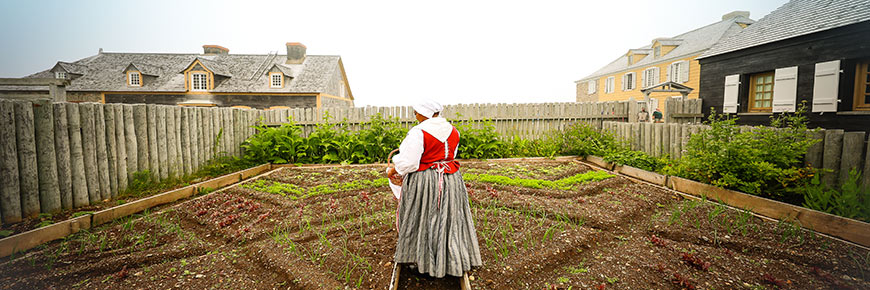
Heritage gardens
Fortress of Louisbourg National Historic Site
The Fortress of Louisbourg National Historic Site is home to five heritage gardens, cultivated for their interpretive value and based on original 18th century plans from the time when the French occupied Louisbourg.
An authentic glimpse into the past
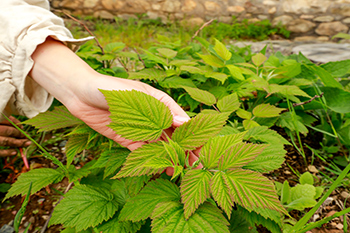
Three of the gardens onsite are examples of potager (kitchen) gardens. Two of the gardens are ornamental and reflect the elite status of the people who owned them in the 18th century. All of the gardens use the principles of geometric design and mirror-imaging, imitating the famous gardens at the Palace of Versailles in France. When you visit today, you can explore garden pathways lined by colourful vegetables, fragrant herbs, and beautiful flowers. Each garden is enclosed by a piquet wooden fence, which blocks the wind and makes them the perfect, quiet spot to feel transported to another time and place.
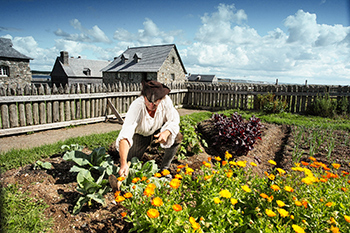
The designs of the gardens and the tools used are replicated from various reference books, including an 18th century gardening manual, “La Nouvelle Maison Rustique”, by Louis Liger, 1701. Using historic letters and legal documents from the archival collection, as well as resource books which cite the provenance of various vegetables, Parks Canada was able to choose plants based on what was likely growing here in the mid-1700s. The seeds used are primarily heirloom, and the varieties chosen are dated back as early as possible, in attempts to get as close to what would have been at the Fortress in 1744. Modern hybrid seeds are not used.
The gardens have been a part of the reconstructed site since interpretive programs first started in the late 1970s and early 1980s. The newest garden on the site, located behind the ordonnateur’s residence, dates to 1987. All five gardens are planted on the original grounds where they would have flourished 300 years ago (1713-1758).
Bringing the gardens to life
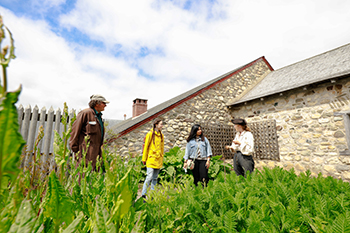
The gardens are tended year-round by dedicated Parks Canada staff. From June to October, gardeners work in 18th century reproduction costumes, and use authentic tools and work methods while visitors are present on the site. During the low season, and in early hours before the site opens, some modern conveniences are used to make the work more efficient (such as garden hoses). The gardens are organic, and use compost as the only fertilizer. Vinegar – which traditionally is fermented wine – is used for weed control along the pathways. Pest control is accomplished by using companion planting (for example, growing chives along the border of gardens to deter insects), hands-on removal, and soap and water sprays.
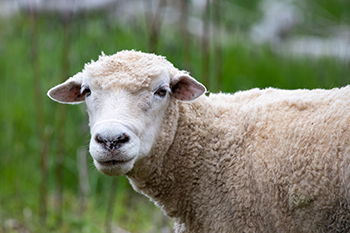
Gardeners welcome inquisitive visitors who come to find them while they tend the gardens, and are happy to answer questions about this unique feature of the site. For gardening enthusiasts, guided experiences are also available. Contact the Fortress of Louisbourg for more information.
Of course, a visit to the gardens is not complete without saying hello to the many heritage animals who also call the Fortress home. Chickens, turkeys, geese, sheep, and goats all help to bring the site to life for visitors.
Connecting to young visitors

For young visitors, the Rookie Tour offers a way to get up close and personal with the heritage gardens and animals. This 45-minute tour is offered from July 1 to August 31, and invites children aged 5 to 8 to experience life in the 18th century. Additional fees apply.
Do the Parka Garden Scavenger Hunt! Travel through the gardens at the Fortress of Louisbourg in search of calendula, lavender and more. Pick up a paper copy of the scavenger hunt at the De La Plagne House. Plant your own small-space garden at home! Visit the Club Parka page to learn more.
Related links
- Calendar of events
- Outreach Programs
- School Programs
- Louisbourg Lighthouse Centennial Celebrations
- Travel trade professionals
- Daily schedule
- Mi’kmaw Interpretive Centre
- Tours
- Fire a cannon: Have a blast at Louisbourg!
- Fire a musket: Have a ball at Louisbourg!
- Time Travel
- Overnight accommodations
- Prisoner of the Day
- Dine around the fortress
- Kids' Corner
- Walking trails
- Unsupervised beaches
- Parks Canada Xplorers
- Get involved: Volunteering
- Date modified :